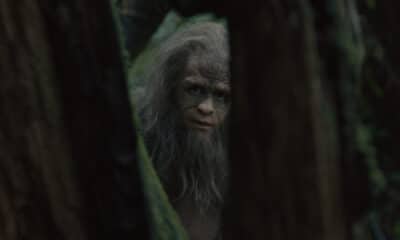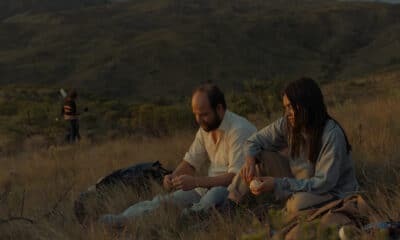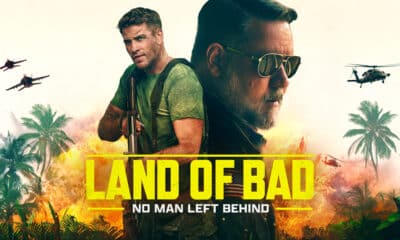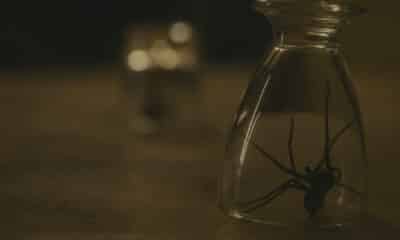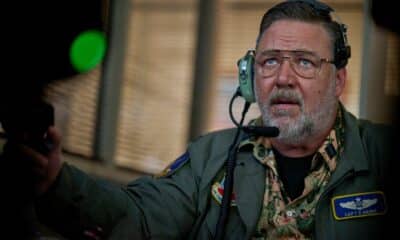Paul Hyett began his film-making career in the special effects make-up area and is most famous for creating the Crawlers from Neil Marshall’s The Descent. However, during the last decade he has moved into the directing chair and has carved a richly varied filmography. His back catalogue includes horror / thriller The Seasoning House, werewolf horror Howl, and nun chiller Heretiks. His latest feature sees him step into the science-fiction realm with Peripheral.
The film stars Hannah Arterton, whom previously starred in Heretiks as Bobbi Johnson, a young literary sensation facing her difficult second novel. Already dealing with a crazed stalker and her junkie ex-boyfriend, Bobbi is convinced by her publisher to use new smart editing software and finds herself going head-to-head with an artificial intelligence determined to write her book for her. As the machine manipulates her work to suit its own nefarious ends, Bobbi begins to realise that she is being controlled in ways far more sinister than she suspected. She may, in fact, be a pawn in a conspiracy of social mind control. Too far down the rabbit hole to turn back, Bobbi must keep writing, fighting her own addictions and hallucinations as she rushes to beat her deadline without selling her soul in the process and becoming a cog in a monstrous machine.
The film debuted in 2018 at Arrow Video FrightFest’s Halloween event and its themes of social control, media consumption, and isolation have only become more relevant in our current climate. It finally arrives on digital platforms on the 3rd August, and we can confirm that it’s one claustrophobic body horror that gets under the skin. Ahead of the release, we caught up with Hyett to find out a little more about the project.

You’ve had a prolific career in special effects make-up, what made you take the plunge into directing?
We shot The Seasoning House in 2011, so it would have been a good three years before we shot it that I was talking to a producer friend of Michael Riley, and he was just saying, ‘do you ever want to make a movie?’ I said yeah, but I was quite successful with the make-up and had a workshop and staff; it was hard to find the time to do anything else. For years I had been supplementing other director’s visions, and watching them and how they told their stories. I worked with a lot of really good directors, and I also worked with a lot of bad ones. I’d think, ‘why are they shooting from there? Why from that angle? Why are they letting that actor do this walk? Why have they blocked it out this way, it doesn’t quite work’. So I think there was a very frustrated storyteller inside of me that started to want to tell my own stories. Me and Mike had that conversation, and decided to try and do one.
On and off I was writing for about a year and then a friend of mine introduced me to a producer at Templeheart, and they loved the script and agreed to finance it. I was very much, ‘I’m going to keep my workshop in case I do a bad job’. We made it, it was the opening film at Frightfest, it started to get good reviews and then I literally just gave up my workshop. I committed myself 100% to directing. A lot of people were saying, ‘don’t, you never know what’s going to happen’. But I thought, you just have to put all in and it went from there.
We talked a lot about what film should be the first one. We thought to get noticed, let’s do a film that’s really, really out there. I didn’t want it to be a prosthetic or SFX-laden movie. I wanted to do a really interesting horror / thriller, set in real world events, in a war zone, but try and do it not as an exploitation movie as much, more drama essentially, but one with a fairy-tale aspect. I wanted to do something as different as I could to get noticed really.
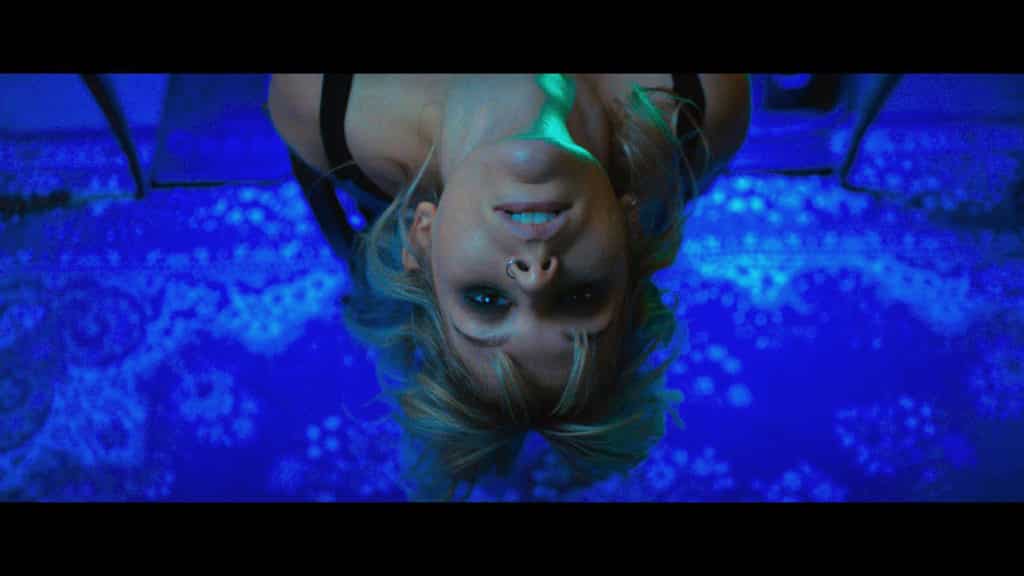
How did Peripheral come together?
The producer, Craig Tuohy… we’ve know each other for a while and we’ve talked about doing a movie together for ages. He was a fan of The Seasoning House; he really got it and we talked about doing a movie and this. He said, ‘let’s meet up, I’ve got a script’. We met up and had a drink, and we were talking about it, and he said, ‘look, I’ve got this script. It’s one girl, in a room, alone in a flat. It’s about AI and an artist’s struggle’. I was honest and said it didn’t sound like what I was looking for. I’d done Howl and that was a big werewolf movie, loads of effects, bigger budget, and I thought I want to keep going in that direction; bigger movies, bigger effects. He told me to just read it, and I read it and thought I really like it. I’m a huge fan of Cronenberg, Videodrome, and body horror, and also at the time I was writing a lot of scripts. I was under pressure to make them more family friendly, or not be quite so controversial or be so… I was really being pushed to conform to a certain type of film, a certain type of genre film that I didn’t really want to make, but I thought I should be making them as they were going to make money, like other people are doing. So I was sort of feeling that artist struggle that Bobbi was. Also, The Seasoning House got a lot of good reviews and trying to get the second and third ones out to be as good, or getting people’s attention, is harder the second time. So I kind of felt a lot of what was going on with Bobbi. I thought I can really relate to this. I really like this script I want to do it. I called Craig and he was surprised, but we started talking about the encroaching algorithms of streaming sites where everything is being configured to work for the particular streaming site. They work out how long someone has watched a programme for, which one they’ve watched the most, when do they turn off, what directors they like. It was something that was really fascinating, the death of independent spirit and art can be sidelined for what exactly works for what demographic at the exact time. There were all these things at the time we were making Peripheral, that at the time felt so relevant, that actually are more relevant now. All the layers of the story really appealed to me.
The film was completed a while back, but has suddenly taken on new relevance with the whole fake news side and even being locked up in doors. Do you find yourself looking at it differently now?
You know something, I wish I had seen Covid happening cause I could have put that in, she’s in lockdown during the Covid. But yeah, it’s one of those things .You always worry when you make a movie that by the time it comes out either someone else has done that idea, or politics etc. has moved on, and you’ve maybe missed the boat and feel like an old film. But we’re really pleased that the film is coming out at this point now.

The film hinges on the role of Bobbi, when did you realise that Hannah was the right choice?
We looked at a lot of actresses for the role of Bobbi, but I always had Hannah at the back of my mind. I thought the good thing with Hannah is she’s great, she’s wonderful to work with, she’s a great actress, but I knew her. We only had four weeks to shoot Peripheral and it was obviously going to be a really intense shoot and very emotionally draining for an actress. You always have that worry about not knowing an actress very well and trying to create that shorthand together. Hannah came and auditioned and I said, ‘I really want to push for you because I think you’d be great, and we know each other’. Just from working with her before, we get there on set, we have a quick chat, we know what each other is thinking. She can read me like a book. Also, she got Bobbi. There was also a part of me that thought she looked like a young Debbie Harry, and Videodrome was one of our influences. We talked about the character arc of Bobbi, the descent into madness, and we were both really on the same page with Bobbi. I was really lucky to get Bobbi, and everyday we just went in and nailed it. I’m really pleased with what Hannah did.
Having that pre-established relationship must make it easier as well. There are some really vulnerable moments, physically and emotionally, so that trust must help?
Absolutely, and for the pregnant stomach she’d go through three hours of make-up and she’d come out, and it was really full on. Days and days of sitting in that chair. She’s very energetic, and just for her to be in that chair…she just really played Bobbi. I think it’s one of Hannah’s best performances. I really think she really got that character and I think the way we shot in that intense four weeks, in that flat, which was built in an abandoned school, so I could do what I wanted with the camera – it really was a very tight, intense, four weeks.
Your previous film Heretiks was filmed all on location in some historic buildings where you couldn’t do a great deal. Was it nice to have a set that you could have complete control over?
Yeah, absolutely. With Howl and Peripheral we were able to build sets, and you can do what you want – even quickly drill in there, put a nail there, put a rig there, put this splat of blood here, smash this, break that – just anything you want. With Heretiks you’re in Margam Castle where you can’t spill blood. If you put blood there, it stains 500 year old stone, and you can’t drill anything. You’re always very much wary of that. There was one time we were in this old building, it was hundreds of years old, and there were bats in there. We were told – ‘if a bat flies out during the scene, you’ve just got to let it do it’s thing. You can’t harass it. You can’t shoo it away’. I asked if we could just swat it away and was told, ‘no, if you hurt, or cause distress to a bat, you can be fined’, I think it was like £5000 or put in prison for three years. I couldn’t believe it. I was shocked. So sometimes we’d be filming a scene and a bat would just fly into shot and we’d just have to cut. The bat would just be flying around and I’d be thinking, ‘hurry up, we’ve got four shots to get in the next hour’. We lost so much time to those bats. There was one time when I needed the fire on, and a bat had decided to nest in the fireplace. I asked if we could whoosh it out the top and they said, ‘no, because if it goes out up the chimney the bright light would distress it. It’ll get confused and we could get prosecuted for that’. It was just really weird. The bat was the most protected person on the shoot… should have given it its own Winnebago. Heretiks was great because we were in Margam Castle, which is the most haunted castle in England. There was this lovely atmosphere of being in this castle, and you really felt like it was this old piece of history, so that was nice. But I will be happy to always shoot on a set.

In the film, Bobbi prefers her typewriter to computers – are you more tech savvy or old school?
A few years ago, I was a bit of a technophobe. In prosthetics everything is low-fi. You make your mould, you pour your liquid in, you dry it with a hairdryer. It’s real old school sculpting and moulding. I’d only really use computers for my breakdowns and a bit of concept work. But for Peripheral, I really had to start understanding where AI was going. How computers can spy. The way quantum processors work. The different types of motherboards, and what makes a computer powerful. What are the AI specifics. So for a few months I was really trying to understand computers and technology, and now I actually really like it. I’m really into it and have a really powerful computer. So I went from being a technophobe to being really quite tech savvy now. It’s weird.
Given your history in practical effects, where do you sit in the practical versus CGI debate?
Some people are really CGI phobic, whereas I’m actually a huge believer in CGI. It comes out of two things – logistics, and a reliance on one without the other. I feel on set sometimes you haven’t got the time to do something practically, and you can quickly shoot the elements and do it in CG. But for me, it’s about how do you enhance your prosthetic stuff? Sometimes people rely completely on CGI and it just looks like a cartoon. Sometimes in practical, they want to show off ‘we’re doing it all in practical’ and it isn’t that great because you could have enhanced it. It’s all about… if it’s done properly and you use the right of practical with the right amount of CGI, then there’s no reason why something can’t look flawless.
A lot of it comes down to physics. It’s really hard to do hair movements, and blood squirting out and hitting the floor or a wall cause it sometimes just looks animated. Whereas it always works practically. Ideally you go shoot your blood elements on a green screen separately to get all the physics, the splatter and the way that the drips hit. Then you shoot on set what you need and you put the plate together in post production. Those are the moments where it works really good. In The Seasoning House, we had a knife going through someone’s cheek; we got a false cheek and we penetrated it with a knife, and then we tracked it onto a real person, and it’s great. I’m a big, big believer in CGI, but it has to be used right. No one ever notices good CGI because it’s so good. When you look at how David Fincher uses CGI, his films and his TV are filled with CGI, you just don’t realise it. It’s only when someone watches something and it has a sort of dodgy bit of CG – usually because they’ve had a thousand shots to make on a movie and some just have to be given up on – and you go, ‘that was a bit of a dodgy shot’ but you don’t look at something and go, ‘that was an amazing shot’, because you shouldn’t really notice it’s there.
It’s amazing what you can do with CGI, but if I was going to do someone’s head being chopped off I would use some kind of practical element, but it would be heavily enhanced with CG – eye blinks, cheek movements – I would try to do stuff that, with a practical head, is really hard. Once you’ve chopped a head off, unless you’ve got really complex animatronics in there, which aren’t going to break when it hits the floor, just to be able to go in and work the eyes closed and mouth open. I tend to think now, try and do something in CGI, but when you need physics-like references and certain things that you can only really do in practicals, then I’ll get some practicals.
Something like The Descent, I think it would work much better in the practical way. Because it was so darkly lit, everything was slimy, everything was humanoid. The good thing about The Crawlers, and at that time I think it was the first British film to feature so many silicon make-up. Silicon make-up was just done here and there, and then I thought we’re at a point where we can do everything in silicon. Obviously if those creatures needed to be eight foot tall then we would have needed to give them stilts and green screen socks and replacement creature legs, so everything we needed on The Descent was practical. With Howl we used practical creature suits, and for the big dude we had CGI face and CGI legs. For the female creatures we had CGI legs, and all prosthetic, so it really is about trying to work out what you need from that scene and the best way of doing it really. Even now, you have people on film sets, we need four hours in make-up, we need animatronics. Animatronics are pretty much gone now, I don’t know anyone who’s really using them anymore. Make-up and prosthetics will always have its place.

Fifteen years later and people are still very passionate about The Descent, it must be nice to know it’s still so loved.
It was the film that made my career really. So many people regard it as a classic, which is wonderful. It was a hard job. It was a really tough shoot, but ultimately really rewarding. I remember when we shot it I was thinking at the time, ‘I think this is going to be good’, and you never quite know. You’re shooting stuff and you wonder how they’re going to put it together – is this going to work? But I kind of knew on The Descent. I just thought it was going to be a good movie. Obviously it ended up being one. I put movies down to this now – if it’s a really hard, stressful job, the harder it is, the better it turns out. The jobs where I’ve had really great times on have always turned out a bit bad. It really seems to be a rule of thumb. It’s one of those things where it must just be a coincidence, but for me, the harder jobs have always been in the better films.
The Descent also features a cast that is pretty much entirely female, lots of strong female characters. That seems to be something that you have followed on in your own directing work…
Yeah, absolutely. I think sometimes girls can be a bit more complex than guys. Most of the stuff that I write tends to be female-driven. I think women just sometimes work better, especially in those types of environments, they work with a much more layered response. Guys tend to turn into alpha males… Maybe it’s just that I was absolutely in love with Ripley in Aliens since I was a kid. I just thought that she was such a bad-ass female. But it was also so layered, she was such a layered character. I think sometimes with a female character, you can play much more on the emotional side, the vulnerable side and the physical side, whereas guys already have that physical side. I just think there’s more to it when you write a female character to be honest. I also loved Sarah Connor in the Terminator movies so I think a lot of it was that I had so much respect for the female characters of the movies I grew up with. People like Arnold Schwarzenegger and Stallone and Bruce Willis, they’re all alpha guys and they’re not written with that much depth. You watch and it’s about a guy who’s, ‘I’m gonna kill everyone to get my daughter back’. That’s pretty much it. Whereas Ripley – you can write a five page essay about her strengths, her vulnerabilities, her characteristics that sort of stuff.

Some filmmakers seem quite content to stick within one genre, or one branch of genre, whereas you seem to change things up almost every film. Within your last three films you’ve been in the medieval times, modern times, and almost near-future worlds with Peripheral. What compels you to keep switching things up?
I think if you’re going to spend two years on a film then you want to tell something new and fresh. A new angle, a different story, I would never really want to make the same movie again and again. I see people doing that and I always think, ‘great, you’re making movies, but why did you want to make the same thing, with the same sort of characters, the same set-up, the same concept? Even visually, you’re shooting it the same way’. I just think as much as I can I try to tell things different visually, and I really do try and strive to tell all stories from a different…it’s a different story so it should have a different visual, a different aesthetic, characters. I really do push for that.
You’re working on a couple of projects at the moment. What, if anything, can you share about them?
One is The Black Site, which is the second part of my war trilogy. Grimmfest films are producing it. Basically it’s about a female intelligence officer, she’s been dishonourably discharged from her tour of duty in Iraq. She’s suffered a traumatic injury and when she gets home, she’s having these horrible hallucinations and visions. She fears for the safety of her family and she starts to go into regressive hypnotherapy. She then starts to remember things that she has no knowledge of. The further they go deeper into her memories, there’s all these missing spots. It all turns out that something happened at a black site facility in the covert interrogation department that she was working in. She starts to piece together what happened in this missing month and she’s convinced she’s been manipulated and possibly altered. It’s like a mix between Zero Dark Thirty and Jacob’s Ladder.
The second one is Unnatural Selection. That’s a Washed Ashore production. It’s a very New England, Stephen King-esque horror set in Cape Cod, in a sleepy town. There’s a conspiracy theory TV show at night and they cover every conspiracy theory, whether it be flat Earthers, anti vaxxers etc. One day a mysterious figure walks in claiming to be a fallen angel. They say we’ve got a spare spot, let’s get him in. They start to realise there’s a lot more to this guy. The more the night goes on, the more they begin to believe he’s actually real and his intentions start to become clear. It’s kind of like… remember the film Mister Frost and those films where it’s ‘is this guy the devil or not?’ Angel Heart, but very much in a Stephen King way.
Peripheral arrives on Digital HD on 3rd August 2020.
Kat Hughes is a UK born film critic and interviewer who has a passion for horror films. An editor for THN, Kat is also a Rotten Tomatoes Approved Critic. She has bylines with Ghouls Magazine, Arrow Video, Film Stories, Certified Forgotten and FILMHOUNDS and has had essays published in home entertainment releases by Vinegar Syndrome and Second Sight. When not writing about horror, Kat hosts micro podcast Movies with Mummy along with her five-year-old daughter.

Latest Posts
-


Apple TV
/ 15 hours agoTrailer: André Holland leads Apple’s new limited series, ‘The Big Cigar’
Apple TV+ has released the full trailer for The Big Cigar, a new, six-episode...
By Paul Heath -


Film News
/ 16 hours agoUK trailer, poster and release date for Sundance smash ‘Sasquatch Sunset’
Premiering in the UK at the Sundance London event in June is the brilliant...
By Paul Heath -


Disney+
/ 18 hours agoNew trailer for ‘Becoming Karl Lagerfeld’ with Daniel Brühl
A trailer has landed for the June-released Becoming Karl Lagerfeld, the Disney+/ Hulu series...
By Paul Heath -


Film News
/ 18 hours agoUK release date revealed for Cannes film ‘The Delinquents’
MUBI has announced the release date for The Delinquents, the Cannes Un Certain Regard-premiering...
By Paul Heath


